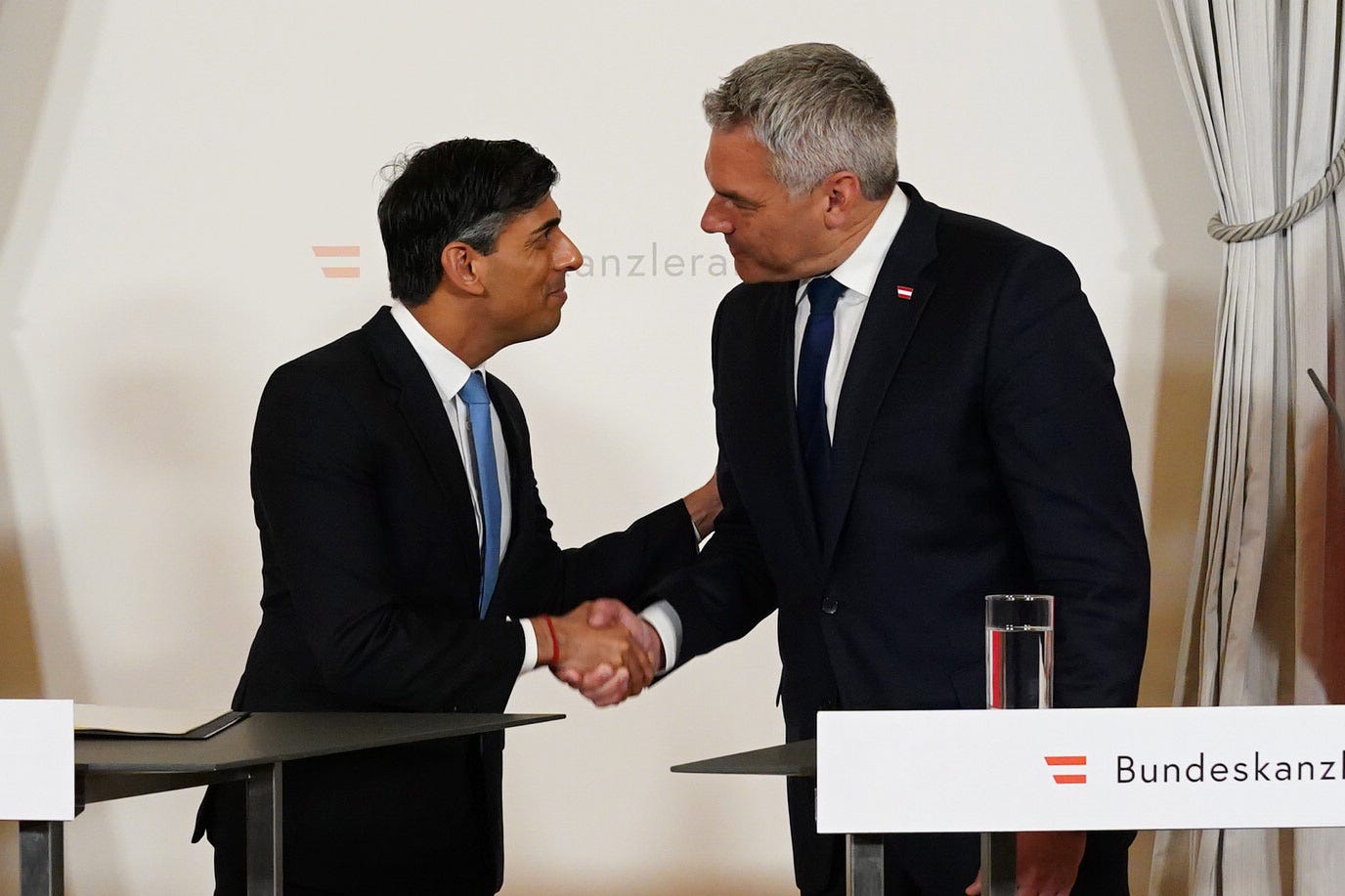Will any European country really adopt Rishi’s Rwanda plan?
As the prime minister visits Vienna to pitch his shabby flagship asylum policy to politically sympathetic EU leaders, Sean O’Grady says surely he has more pressing matters – not least trying to get us an improved Brexit trade deal?


It is more than a little pathetic to see a British prime minister touring the capitals of Europe on a quest for approval.
The bizarre Rwanda plan to deport refugees to a “safe” third country – a plan to which Rishi Sunak seems so devoted, it might as well be one of his children – has been blocked by the courts, assailed by the House of Lords, ridiculed by the Labour opposition, and derided by some in his own party as unlawful, immoral, impractical and obscenely expensive.
So instead Sunak takes his spurned little project abroad to show to like-minded leaders in Europe in the hope they will lavish praise and approval on the scheme – starting with the Austrian chancellor, Karl Nehammer, in glittering Vienna.
Sunak hopes that, in time, others too will back his plan, the better to persuade the sceptics back home that it’s a brilliant idea, good enough to export. Who knows, the Germans might even buy it. They certainly don’t buy much else from the UK.
Some of us might think Sunak and his team would be better off trying to get us an improved Brexit deal, pushing for a European defence and security community, or a way to regulate AI – but the small boats dominate the Sunak administration’s domestic and foreign policy agenda.
It is an even stranger pantomime when you remember that one of the few definite promises the Labour Party makes is that Keir Starmer will scrap the scheme on day one of his administration. But still, Sunak is pushing it and claiming everyone in Europe wants a Rwanda scheme of their own, like it was the latest computer game or wacky trainers.
Except, of course, none of them will actually be copying the UK-Rwanda agreement for precisely the same reason it has been so very difficult to make it work here: it breaches the European Convention on Human Rights, and all of Europe, aside from Belarus and Russia, remains signed up to the historic 1953 accord.
If the Europeans are interested in anything it is in “offshore processing” – the admin being done according to, say, Danish law (Copenhagen is also interested in the British experience), and, if approved, then the refugees would be either allowed to settle in Denmark or sent somewhere else, provided it is safe.
That may sound similar to Rishi’s Rwanda arrangement, but it is actually fundamentally different – because the Europeans as yet do not propose to send genuine refugees to a third country and leave them there, which is the more important leg of the British policy. The difference is that, stricter as they are becoming, the Europeans are not willing to abandon the principle of protecting universal human rights.
Besides, the Europeans also know that past deportation schemes have failed. The much-vaunted Australian “Pacific solution” (the inspiration for Britain’s Rwanda plan), which sent people to camps in Papua New Guinea, Cambodia and Nauru, collapsed under the weight of human rights abuses and costs. Now, the Australians rely on “push-back” at sea – which is not going to work in open-bordered Europe.
There was even a Rwanda plan that was agreed with the Israelis, which didn’t work because the Eritrean deportees absconded and just tried to go back to Israel.
But what if the whole of Europe did adopt the Rwanda plan with other countries? Could it work? The answer is, of course, no – for exactly the same reason the British plan doesn’t work. The schemes are likely to be far too small to cope with the sheer numbers involved; the risk of “refoulement” – being sent back to be executed or tortured –is probably equally high; and the policy cannot act as a deterrent because these people are already risking their lives.
The evidence at the moment, of record numbers of small boats crossing the English Channel, suggests that the Rwanda plan is already failing. Sunak, facing electoral oblivion in a country more worried about its public services, should have better things to do than flying around Europe flogging a dead policy.





Join our commenting forum
Join thought-provoking conversations, follow other Independent readers and see their replies
0Comments